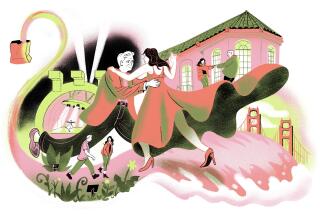THE PINNACLE FOR PEN PALS : Friends Meet After 25 Years of Letters
- Share via
At a time of instant communication, quick-hit e-mail messages and faxes,
Shelley Donoughe of Michigan and Elizabeth MacDonald of Australia have determinedly preserved the time-honored art of letter writing.
Through hundreds of dispatches spanning 25 years, they have shared life’s most intimate details and dramatic milestones--the first date, marriage, pregnancy, a divorce, deaths--all via airmail.
Theirs is a story about the durability of a friendship, sustained across thousands of miles with something as simple as handwritten lines jotted on a piece of paper. For the two women, now both 38, writing letters became a part of their routine, serving as an extraordinary record of ordinary lives.
And on Monday--in what for pen pals is the pinnacle of a successful relationship--the two met for the first time.
“It’s just so good to finally be able to hug her after all these years,” said Donoughe, who flew in from Detroit on Monday morning and was waiting at LAX’s international terminal to greet MacDonald and her two sons as they bounded off the plane from Tasmania.
Said MacDonald: “It’s a hug that’s been 25 years in the making.”
Since neither of them had been to California, the two pen pals figured Los Angeles would be the perfect meeting place--a sort of midpoint between their two homes.
*
Donoughe had told MacDonald she would meet her today at their hotel in Anaheim, but she decided to come in early as a surprise.
After spotting her at the international terminal, Donoughe ran up and exclaimed: “Good day, mate!” “This is wonderful,” MacDonald said, embracing her friend.
Then they stared at each other for a few moments, in silence.
“People say, ‘I can’t believe that you still keep in touch,’ ” Donoughe said. “It’s too easy to let friendships fall back because you get lazy. Even if we didn’t have too much to say, we would just send a note saying, ‘Thinking of you.’ That’s all it takes to keep it going.”
Social historians and biographers--who rely on written exchanges to examine the past--worry that this type of correspondence and its rich details about relationships will become rare in an age of quick electronic communication, which often dissipates into cyberspace.
“You have to have documents to write history,” said Lois Banner, chairwoman of the history department at USC. “Letters are absolutely crucial.”
*
For example, Zelda Sayre wrote of love, loneliness and passion in letters to her fiance, F. Scott Fitzgerald. Emily Dickenson’s posthumous fame began with the publication of her poems and correspondence. And Catherine the Great often sent letters to Voltaire and other French thinkers.
With the growing popularity of e-mail, Banner said she worries for “the next generation of historians.”
“Letters are a powerfully evocative record of who you are,” she said.
Despite the lure of modern technology, Donoughe and MacDonald treasured the practice of sitting down with a pen and a clean sheet of stationary. It was just more personal the penmanship way.
The two women were paired up in 1971 at age 13 through an international pen pal service, advertised in a teen magazine, because their birthdays are only a few days apart.
Donoughe, who was living in Amherst, Ohio, at the time, sent the first letter.
“Dear Elizabeth,” Donoughe wrote in cursive writing on garish Owl-shaped stationary. “Hi! Is it alright if I just call you Liz. . . .”
MacDonald, who was living in South Launceston in the state of Tasmania, immediately sent off her response.
“Dear Michell,” she carefully printed on white, legal-sized paper. “I don’t mind if you call me Liz. I get called that by most of my friends anyway. . . .”
As the years went by, they told each other what mattered most, dropped the letter in the mail and waited weeks and sometimes months for a response. Once, MacDonald told Donoughe not to worry if she didn’t receive a letter right away.
“I hope you don’t think I’m not going to write to you again because you are going to be my pen pal and best friend for the rest of my life,” MacDonald told Donoughe in a letter sent in 1972. “Even when I’m 90 or more, I’ll still be writing you.”
The two had come to depend on each other for friendship, while finding personal solace in the cathartic act of writing their inner-most thoughts.
“She was someone I could laugh with, someone I could be sad with,” MacDonald said. “It helps sometimes to be able to write things. You need to get things out of your system.”
The two women were amazed to find out that they were both pregnant at the same time with their first children. “I haven’t had any morning sickness either,” Donoughe wrote in 1984. “We’re too much alike. . . .”
Following their mother’s tradition, the women’s two oldest children--both 12--have become pen pals.
The two women had talked about meeting when they were both 50, perhaps in Hawaii with their husbands. But after MacDonald’s husband was killed two years ago in a car accident, they decided they didn’t want to wait that long to get together.
The two women arrived in Los Angeles carrying old letters, pictures and gifts and with a classic Southern California tourist itinerary.
The pair and MacDonald’s sons Brendan, 12, and Adam, 5, plan on spending six days in the region, visiting Disneyland and Universal Studios. Then, they’ll travel to Donoughe’s home in Rochester Hills, Mich., where MacDonald and her children will stay for three weeks before returning to Australia. Donoughe has three children, but could not bring them on the trip.
Their first in-person exchanges, predictably, were about their letters.
“I’ve got the ‘70s,” Donoughe said, handing over a neat stack of a decade’s worth of air-mail envelopes.
MacDonald pulled out a pouch stuffed with photographs Donoughe had sent her over the years. “Isn’t this you on your honeymoon?” she asked. They laughed.
Then MacDonald dug unto the bottom of her bag and pulled out an old card Donoughe sent her when they were teens. It said, simply: “You are a once in a lifetime friend.”
More to Read
Sign up for Essential California
The most important California stories and recommendations in your inbox every morning.
You may occasionally receive promotional content from the Los Angeles Times.










